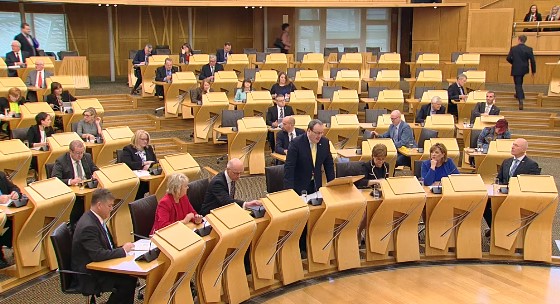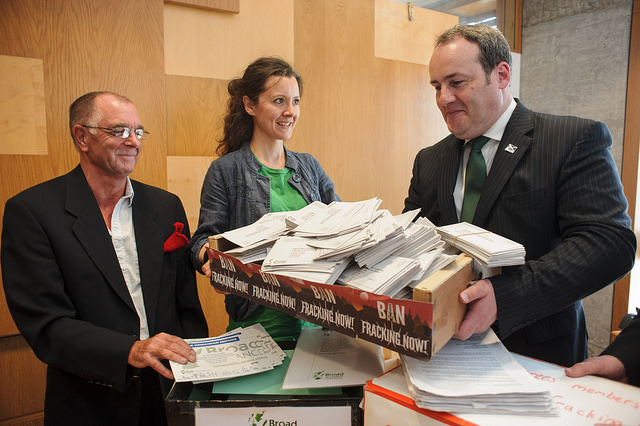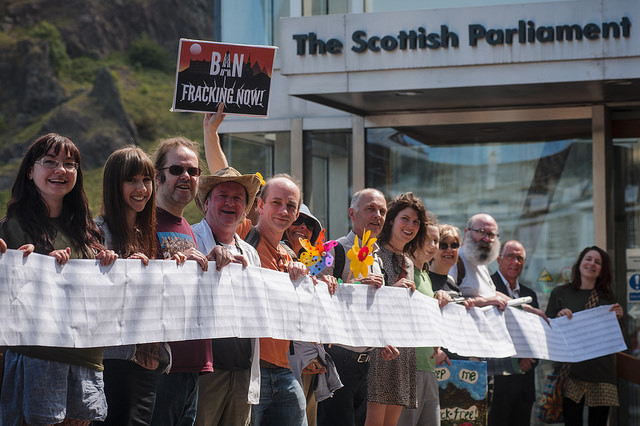
Paul Wheelhouse announcing the Scottish fracking ban on 3 October 2017.
INEOS Shale announced today it has lodged a petition to challenge the Scottish Government’s decision to “effectively ban” onshore unconventional oil and gas extraction.
Opponents of fracking have described the news as predictable and desperate. The company was accused of “trying to keep alive its hope of ever making any money out of a toxic industry”. The Scottish Government said this afternoon the ban had been reached in “a careful and considered approach”.
Scotland’s Energy Minister, Paul Wheelhouse, announced on 3 October 2017 a new planning policy of no support for fracking in Scotland. This followed a two-year period of research and consultation. The decision was backed by the Scottish parliament on 24 October 2017.
Mr Wheelhouse said the Scottish Government had a moral responsibility to tackle climate change and an economic responsibility to prepare Scotland for new low carbon opportunities. He also said in the communities most likely to be affected by fracking there was no social licence.

At the time INEOS’s operations director, Tom Pickering (left), said the decision “beggars belief”.
This afternoon the company said it believed there were “very serious errors” in the Scottish Government decision-making process.
In a statement, INEOS said Scotland would miss out on economic and employment benefits that would be enjoyed in England. The company said local communities would not receive what it estimated wold be an estimated £1 billion from “a healthy shale industry”.
The statement quoted Mr Pickering as saying:
“The decision in October was a major blow to Scottish science and its engineering industry, as well as being financially costly to INEOS, other businesses and indeed the nation as a whole. It also removed at a stroke the potential for the country in these uncertain times to secure its own indigenous energy supply. We have serious concerns about the legitimacy of the ban and have therefore applied to the Court to ask that it review the competency of the decision to introduce it.”
INEOS also said in the statement that it any other shale gas operators in Scotland had, up to the moratorium announced in 2015 “invested millions over the best part of a decade in acquiring licences and obtaining planning permissions to construct drilling sites in discrete, safe locations.
“Such investment has been rendered worthless as a consequence of the ban, even in areas where no fracking was proposed. This despite the panel of scientific experts appointed by the Scottish Government concluding that shale development is capable of being managed safely”.
Mr Pickering said:
“If Scotland wants to continue to be considered as a serious place to do business, then it cannot simply remove the policy support that attracted that investment in the first place without proper procedures being followed and without the offer of appropriate financial compensation. In the light of these failings, INEOS has been left with no option other than to raise this legal challenge.”
“No social licence in affected areas”

Paul Wheelhouse (right) receiving petitions opposing fracking on 31 May 2017. Photo: Friends of the Earth Scotland
In a public consultation on fracking in Scotland, more than 99% of the 60,000+ responses were objections.
In his announcement last year, Mr Wheelhouse said
“In those communities that would be most affected there is no social licence for unconventional oil and gas to be taken forward at this time.”
He also said he was concerned about the insufficient evidence on health impacts and he drew attention to the conclusion from KPMG that under its central scenario unconventional oil and gas could represent 0.1% of the Scottish GDP.
Scottish Government reaction
A spokesperson for the Scottish Government said this afternoon:
“We have taken a careful and considered approach to arriving at our preferred policy on unconventional oil and gas in Scotland.
“The Scottish Government’s position was endorsed by the Scottish Parliament in October, subject to completion of a strategic environmental assessment, and follows detailed assessment of the evidence and consultation with the public.”
“INEOS out of step with the public”
Scottish Labour, which opposes fracking, said:
“Ineos is out of step with the public and the Scottish Parliament when it comes to fracking. The people of Scotland don’t want it to happen and the Scottish Parliament has said that it’s not the right option for Scotland – not right for our communities, our water, our air and the future of our planet.
“But this legal action by Ineos suggests it may have received some kind of assurance from the Scottish Government before Labour pressure made the SNP agree that fracking should not take place in Scotland. We know that Ministers met with Ineos on a number of occasions, so now we need to know what was discussed.
“Scotland doesn’t need or want another fossil fuel – we can deliver alternative, sustainable jobs through proper investment in renewable energy and that is where Ineos should concentrate its resources.”
“Poor decision”
Ken Cronin, Chief Executive of UK Onshore Oil and Gas, said:
“When the Scottish Government announced last October that it would be supporting an indefinite moratorium on unconventional onshore oil and gas we commented that it was a poor decision, ignoring Scotland’s rich heritage and expertise in oil and gas. It was not based on the evidence from extensive independent research, which clearly stated that with appropriate regulatory oversight and monitoring Scotland’s regulatory framework is sufficiently robust to manage onshore exploration and production. Today INEOS has asked for this decision to be judicially reviewed, which we support.”
“INEOS decision reeks of desperation”

Petition presented to the Scottish Parliament on 31 May 2017. Photo: Friends of the Earth Scotland
Friends of the Earth Scotland Head of Campaigns, Mary Church, said:
“INEOS’s legal challenge against the Scottish Government’s ban on fracking reeks of desperation from an industry that is failing to get results anywhere in Scotland, the UK or elsewhere in Europe. Wherever fracking has been proposed it has been strongly opposed by local communities and subject to serious delays and mounting costs.
“We are confident that the process to ban fracking was robust and fair, and the courts will find against INEOS. A two-year process looked at mountains of scientific evidence that spoke of the risks of the unconventional oil and gas industry to our environment, climate and people’s health.
“There is overwhelming support from communities on the frontline of this industry, people the length and breadth of Scotland, and almost all the parties at Holyrood for this ban. In challenging this ban INEOS are attempting to overturn a democratic process that engaged tens of thousands of people across the country and found that 99% were opposed to the dirty industry. Sadly, given the companies tactics south of the border it’s little surprise that INEOS are taking this course of action. INEOS are no doubt taking this challenge to keep alive their hope of ever making any money out of this toxic industry.”
“INEOS must accept they lost the democratic debate”
The Scottish Greens have described the decision as predictable and desperate.

Mark Ruskell MSP (above), the Scottish Greens’ climate and energy spokesperson, said:
“This is a predictable and desperate attempt by an industry sinking under public protest in England to try and salvage the last drop of commercial benefit in Scotland.
“Scotland doesn’t want or need fracking and Ineos should accept they lost the democratic debate in the Scottish Parliament, the evidence was there to ban fracking and that is what Holyrood has done.
“This isn’t the first time that big business has thrown their toys out of the pram when they don’t get their own way. This and the recent challenge on minimum pricing shows just how little corporations care for Scotland’s environmental and social wellbeing.”
Categories: Legal

I don’t think anyone expected Ineos to accept the democratic decision of the Scottish government. Ineos are famous for being bad losers. Now it remains to be seen how much influence they have with the Scottish judicicary.
And i say the opponents’ response is “predictable and desperate”
I guess many of us knew about Ineos’ tactics from their approach to union issues at Grangemouth but I have to say they do seem to have remarkable sense of entitlement.
Wow its seems INEOS have such illusions of grandeur that they believe they can challenge a government. I will wait with bated breath, this may well backfire and give grounds for those who oppose fracking to challenge the governance at Westminster?
I think it is more about appropriate compensation ( as per T Pickering ) for monies spent on acquiring licences and carrying out works. If the ban is judged unlawful, I would not expect INEOS and others to try to drill for any Hydrocarbon onshore frack or not, if the government is against it.
I note that Scottish Labour seem to insinuate that the SNP were encouraging companies until they put pressure on the SNP to ban it.
If it was about compensation, they would be asking for such in the civil courts; amazing!
Sherwulf
Yes, that is what they are doing, taking the case to Scotland’s highest Civil Court.
I think the word is compensation, rather than entitlement.
If they prove what has already been indicated, that the decision was not scientifically based, then they probably have a strong case for compensation, which the unions could see re-invested into Grangemouth (lol).
This could be Nicola’s deal with the Greens ending up more costly than Mrs. May’s deal with the DUP. Just at the time when Scottish taxation is being increased!
The SNP are in the pockets of the Green Party nowadays.
Via a very good source from within a law firm appointed by the SNP in 2014 the SNP were forming a case to approve fracking. Since they lost their majority they did a 160. Not a full 180 as its not a ‘ban’ but simply a pause.
Scotland is literally going down the tubes under the SNP, roads are riddled with potholes, hospitals bursting and filthy, education results at an all time low, no economic direction, Edinburgh is doing ok through tourism but that’s due to a weak pound and the money is not being filtered down.
‘Scotland is literally going down the tubes under the SNP, roads are riddled with potholes, hospitals bursting and filthy, education results at an all time low, no economic direction’ am afraid the same in the rest of the UK.
Perhaps GBK, you could have a word with your ‘ global corporate friends’ who have stashed their taxes in ‘havens’? Bring back the money and we can all have good roads, clean and well resourced hospitals and real education instead of industrialization fodder…….
Words fail me at this point, but I’ll try my best to comment.
1 Scotland wants it’s largest industrial/manufacturing plant to stay open? (Grangemouth)
2 Scotland wants to maintain the several thousand direct and indirect jobs that INEOS provides?
3 Scotland is quite happy that INEOS and it’s employees contribute – Petroleum revenue tax, corporation tax, business rates, employers national insurance, employees national insurance, income tax, apprenticeship levy, value added tax and contribute untold millions to the economy of Scotland?
4 Scotland is quite happy that INEOS have spent several hundreds of millions of GBP updating the Grangemouth facility to use shale ethane and to expand production at the site by bringing previously mothballed plant back on line, contributing yet more to the local economy and displacing foreign imports?
5 Scotland is quite happy that INEOS apparently, after years and years of doubt, seem to now regard the Grangemouth facility as a key strategic asset in its European petrochemicals manufacturing portfolio?
6 Scotland is quite happy that Mr Ratcliffe and INEOS are actually passionate about wanting to regrow the UK/Scotland/England petrochemicals manufacturing base, similar to what has happened in the USA now that a low cost, plentiful and secure feedstock is available there?
7 Scotland is quite happy that INEOS is investing millions of GBP in developing a vertically integrated oil and gas and petrochemicals business in Scotland and is investing heavily in the future of the North Sea industry, mostly in Scottish waters?
8 Scotland is quite happy that the Grangemouth site’s future is now secure in the medium term because it is shipping liquid ethane across the Atlantic ocean to Scotland? And Scotland is quite happy that the wealth produced by doing so is entirely due to the ethane produced by fracking of shale gas wells in the USA?
Yet the Scottish government, wanting all these things stands in the way of INEOS creating untold billions of wealth and thousands of new jobs in Scotland by banning the very process that in the USA provides the ethane for all this wealth to be created in Scotland? Why exactly does the Scottish government feel empowered to deny it’s very own citizens the benefit of the jobs and the wealth that will be created if INEOS is successful in its tight gas developments? Do the people of Scotland REALLY understand what their elected representatives are doing to their economy? Vague references by the Scottish government to unspecified “green” initiatives are no substitute for real jobs and real wealth creation. Do we really want these high skilled, high paid jobs in Scotland, or do we want them in Asia, the Middle East, America and elsewhere?
I could go on……… But I won’t.
Good luck INEOS, I hope that against all the odds you win your case and provide the thousands of future jobs and billions of GBP wealth for the people of Scotland. They deserve it.
Promises laced with threats aren’t the best form of argument Fred. The most impressive progress made by Scotland is that made in renewable power generation sector over the last few years. Throughout history Scots have led the world with progressive innovation from, James Watt and John Logie Baird (steam engine and television) and many more. What you’re talking about is regression.
Luckily James Watt managed to fight off the anti-steam engine group who claimed his machine would kill wildlife, involve heavy carts full of coal going down narrow roads, pollute the water supply, affect bats, was financed by foreigners (The English), made the owners very rich, cause light pollution (no, not that one)…..
Well said AI. Hypocrisy is the word for the anti frackers.
And now there’s cleaner ways of doing these things. Time to move on. It was James Watt together with Matthew Boulton who made the steam engine into a highly crafted instrument running around 2000 percent more efficiently than the earliest engines i.e. needing 20x less coal for the same amount of power. Now the leap to fully renewable energy beckons and global innovation is proceeding apace in that field. With the 10-20 years that it would take to get a whole new fossil fuel industry going why miss the boat and end up in a polluting and highly redundant future power source that will get overtaken within that period. What a waste of resources and effort.
Well said Fred, I agree 100%. Also, note that 8 out of 10 homes use natural gas for heating and many UK industries use natural gas in production processes. The North Sea production of gas is declining, meaning that the UK will have to import from the USA and Europe. The Scottish Government’s ban is stupid and does not consider the long-term cost to its population, just to depend on intermittent renewable for energy (electricity). Also, think of the cost of re-wiring all domestic and business properties to use the higher cost electricity produced by renewables. What a farce!
Hardly PhilipP-it is you referring to the past!
It’s quite simple. Nicola will end up with a sizeable bill for compensation as her “fee” to the Greens. The obvious lack of ability within the SNP to manage the day job will be highlighted (again) and she will continue to lose seats, and then she loses control of the Scottish Parliament. And when that happens, the in-fighting starts.
Alternatively, the courts will reject Ineos action and they will simply decide to limit further investment in Scotland, and the SNP will get the blame.
The real winner will be Ruth Davidson. Tough old world, isn’t it?
You blame others for fabrication and speculation Martin – funny that. See my response to AI above. This fee for the Greens looks like a GBK fiction. But hey, why let the facts get in the way of a good story?
I wonder how we are going to make all the petrochemical and petroleum products currently made at Grangemouth if we shut the plant down and build windmills on the land? I am 100% in favour of a diverse and environmentally responsible source of electricity. But when we have the windmills instead of the Grangemouth site where will all the products come from that are presently made there? You guessed it. We will import them. At the same time as exporting our wealth and our jobs. The centre of production of the “nasty stuff” you put in your car or make your socks out of will simply move away from the UK. We have already lost around 90% of our petrochemical and downstream industries at great cost to the economy. Do we really want to close it down 100% and do even more damage to the UK economy? Jim Ratcliffe is right. The UK is actually good at this kind of stuff. The jobs are highly paid and highly skilled. Jim R wants to bring all this back to the UK. A great many of us are right behind him. Including, I suspect everyone whose livelihood depends on the Grangemouth site continuing to be a success story for Scotland and the UK.
Where would the whiskey be made once you’d polluted the Scottish groundwater Fred? Your argument also stands upon the assumption that shale gas extraction can be simply ‘switched on’, that it would be straightforward and that it would be profitable – as it has been in America. Big assumptions leading to big promises. The other, slightly more strange assumption, is that everything get’s shut down if you dis-allow onshore unconventional shale gas development, as if everything depended on it.
Ireland or USA as it is currently? Scotland makes whisky 🙂
Fair point AI. I also spell colour interchangeably with color sometimes. It’s a bit like some Scottish people being called Scotch 🙂
We’ll never know, will we? Whilst the Scottish government stands in the way of exploratory drilling and testing we will never know. If Scottish/English tight gas isn’t economic it won’t happen anyway. But it is in the interests of the Scottish people to know and to benefit from the wealth and the jobs if it us economic.
Strange (perhaps not) understanding of Scottish geography PhilipP. Easy to check out where the huge majority of whisky is made. Absolutely no where near areas that could be fracked, so ground water and whisky not linked in any way. Nice try-but you can see why I repeatedly do point out the speculation and fabrication.
Industry becomes centred in areas that support that industry PhilipP. It is not difficult to understand. If support starts to be removed other areas will quickly make a pitch to offer such support and the industry will move there-and as Jim has only recently stated they can make those decisions themselves without a need to consult or placate share holders, the press or anyone else. Perhaps Norway, perhaps Ellesmere Port.
Perhaps you should share your ‘intuitive’ understanding of the areas that can and can’t be fracked Martin. You obviously have more knowledge on the matter than some of the worlds biggest O&G companies and a leading geologist (Prof Underhill: Heriot-Watt’s chief scientist and professor of exploration geoscience) who’ve publicly stated that they did not believe the British Isles offer viable prospects for shale gas developments. Mind you I think they would have relied more on data and evidence than intuition.